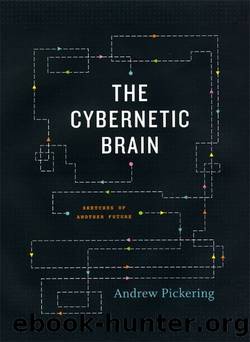The Cybernetic Brain by Andrew Pickering

Author:Andrew Pickering [Pickering, Andrew]
Language: eng
Format: epub
ISBN: 9780226667898
Publisher: University of Chicago Press - A
Published: 2011-01-15T00:00:00+00:00
Figure 6.16.The cybernetics of crisis. Source: S. Beer, Brain of the Firm, 2nd ed. (New York: Wiley, 1981), 354, fig. 48.S.
Little more can be said hereâthis book is not a treatise on recent world historyâbut I do want to note that Beer's "cybernetics of crisis" included an analysis of how crises like the present one can arise. Again, Beer's focus was on transformative flows of information. Figure 6.16 is his basic diagram for considering such processes: the hatched area denotes a crisis affecting three different interest groups, which might be nation-states, A, B, and C. The details are less important than Beer's general analysis of the information flow from the crisis region into A ("sensory input") and the return action of Aon the crisis ("motor output"). What Beer emphasized was that such information flows necessarily impoverish variety, and that in a systematic way. His argument was that representations of crises are inevitably filtered through lowvariety conceptual models, models through which governments interpret crises to themselves and the media interpret them to the public. These models then feed into a low variety of potential actions which return to intensify the variety of the crisis along axes that are unrepresentable in the models, and so on around the loop.
Let me close this section with three comments. First, we can note that this last discussion of the role of models in the production of crises is of a piece with Beer's general suspicion of articulated knowledge and representation. Models might be useful in performance, as in the VSM, but they can also interpose themselves between us and the world of performances, blocking relevant variety (hence the significance of the inarticulacy of Beer's algedonic meters, for example). Second, Beer died before the invasion of Iraq; the above thoughts on that are mine, not his. But, again, I am struck now not by any self-serving quality of his rhetoric, but by the prescience of his analysis. The highly simplifed story of information flows and variety reduction that I just rehearsed illuminates how global politics could have collapsed so quickly into one-bit discriminations (Beer 1993a, 33) between "us" and "them," the goodies and the baddies; how it could have been that a majority of the American population could believe there was some connection between Al Qaeda and Iraq prior to the invasion and in the existence of what we were taught to call "weapons of mass destruction"; how it is that the American public and, perhaps, their government could have expected the invaders to be greeted with flowers and kisses rather than car bombs; and (turning back to the question of controlling variety) why mayhem should have been expected instead. Of course, third, one does not have to be Stafford Beer or a cybernetician to be critical of the war on terror, a "war" in which, "allies are expected to go into battle against an abstract noun, and to assault any nation unwilling to mobilize in such folly" (S. Beer 2001, 862â63). What interests me, though, is the generality of Beer's cybernetic analysis.
Download
This site does not store any files on its server. We only index and link to content provided by other sites. Please contact the content providers to delete copyright contents if any and email us, we'll remove relevant links or contents immediately.
Secrets of the JavaScript Ninja by John Resig Bear Bibeault(21527)
Kotlin in Action by Dmitry Jemerov(20571)
Grails in Action by Glen Smith Peter Ledbrook(17459)
Sass and Compass in Action by Wynn Netherland Nathan Weizenbaum Chris Eppstein Brandon Mathis(14872)
WordPress Plugin Development Cookbook by Yannick Lefebvre(4425)
Ember.js in Action by Joachim Haagen Skeie(4357)
Mastering Azure Security by Mustafa Toroman and Tom Janetscheck(3551)
The Innovators: How a Group of Hackers, Geniuses, and Geeks Created the Digital Revolution by Walter Isaacson(3219)
Learning React: Functional Web Development with React and Redux by Banks Alex & Porcello Eve(3187)
A Blueprint for Production-Ready Web Applications: Leverage industry best practices to create complete web apps with Python, TypeScript, and AWS by Dr. Philip Jones(3136)
Mastering Bitcoin: Programming the Open Blockchain by Andreas M. Antonopoulos(3047)
The Art Of Deception by Kevin Mitnick(2808)
Drugs Unlimited by Mike Power(2596)
Hands-On Cybersecurity with Blockchain by Rajneesh Gupta(2466)
Kali Linux - An Ethical Hacker's Cookbook: End-to-end penetration testing solutions by Sharma Himanshu(2395)
Writing for the Web: Creating Compelling Web Content Using Words, Pictures and Sound (Eva Spring's Library) by Lynda Felder(2354)
SEO 2018: Learn search engine optimization with smart internet marketing strategies by Adam Clarke(2266)
JavaScript by Example by S Dani Akash(2224)
DarkMarket by Misha Glenny(2212)
